Ever thought of transitioning your career into tech or wanted to kick-start your journey in Tech? Well, such thoughts might come across people either from the interest in the technology that’s being surrounded us or from the reference of tech professionals in this lucrative field. Tech has been blooming for a few decades and it still gonna shine in the upcoming days.
Wanna know how I got started in tech? here is my story about I got interested in tech.
Today, I will be sharing my experience and learning how you can transition into tech from diff fields or just being started. First thing congrats for being interested in this promising field, as long as modernization with digital exists career tech will exist out there. Though technology emerges so massively that it has removed many jobs but comes up with new jobs and opportunities too. The secret of getting ahead is getting started.
Mindset
Advocating people even in my initial career was something that I volunteer for and loved. My personal short story is that during my initial career, I have guided a bunch of people. One of them was from a physics background and successfully made a fine career in tech out of it. The first thing is to set a goal for what you are trying to pursue its just either learn tech generally or get the job right after few amount of time. mindset is all you need to clear up that anyone can enter into tech and pursue what path you wanted to achieve out there. This is just an example where people from different backgrounds can able to switch on this field. One of the things that you need to make up is anything can be learned with consistency but takes a little amount of time. Clearing up your mindset gives you one more step ahead to switch on tech. Think about your existing transferrable skills too so you can connect your current skill or hobbies to your proposed tech career path. Setting up clear goals will drive to you more accurate direction and stronger motivation.
Degree or Self-Taught Route
As you clear up your mindset on tech. You might ensure whether getting a degree is worth it or not. The first thing to let you know that where you are. Are you a student or job holder who is working in another field or one who is in the middle of a graduate academia course? Knowing yourself is important so that you can move ahead quicker. As everyone’s path is different and only the advice you follow blindly doesn’t work well. Know yourself where you are, what you are trying to pursue in tech, and so on.
Clear your fundamentals
If you are any one of those or outside of it. I highly recommend verifying your genuine interest in learning the CS fundamentals. Go with this playlist CS50 and make a routine with your available time and complete it within 3-6 months with your choice. With these learning materials, you will explore from programming to bootstrap your ideas. You will get to realize about tech is something that you love or not. CS fundamentals are a must necessary no matter which domain you wanted to pursue in tech.
Once you complete it, you can able to at least make a simple project too. If you are a job holder guy you can pull out the engineering or tech manager if there are any possibilities to co-pilot on their team for an internship or transition out there to a junior role. In case you wanted to go with a traditional degree go with any CS degree with a good university who have alumni with employers of companies. Having CS50 knowledge will be beneficial for you in the 4 year CS degree where you pursue.
Learning resources
The tech industry is way much broader than you think. There are different routes and paths on tech too.
Remember tech is not just for engineers.

If you are something up to building a project on the web and becoming a developer then I recommend following one.
This might be good for a self-taught one who is willing to go on this path. Also, stick with learning programming documentation too in the long run. But being a self, you need a lot of patience and discipline to learn and work on it. Consistency is important here. If you are not sure about multiple career paths in tech, what you can do is learn every week different roles associated with insight min 1-2 months either mobile, web, security, QA, or SEO.
Roadmap for different career option.
During this journey, you should never ask permission to learn things you have your own and don’t need any validation from people. Stop asking permission to learn. Go try things for yourself. After you’ve done that, if you need more direction, find someone and ask. Go and explore with above learning materials. Those are enough for you to get at the footsteps of the door. You will determine which one align with your interest and skills.
Networking
Networking shows people who you are. It’s the development and maintenance of mutually valuable relationships. It’s not about selling, getting a job, or a one-way relationship. It is about quantity. Networking is not only about meeting people, it is about having good friendships and improving your personal life too not just your career.
It opens many doors, provides guidance with industry practices, and helps you stay updated with the latest trends. You can have networking opportunities online or at events. Twitter and Linkedin are the platforms where you can have networking opportunities with people.
If you are a student at university, you can leverage your college career center. Involve with clubs related to tech where you can have mentorship and help from seniors. Many universities have dedicated career centers that offer resources and help for summer internships too. They might also help you with resume guidelines, and interview preparation, and connect with alumni who are industry-working professionals and employers too.
Tech Events and Opportunities
If you wanted to know what industry practices are being done and what trends are going on. Attending tech events might be a good way to get such exposure. Meetups can be a great place to find your local events. Only attend meetup events associated with your goals.
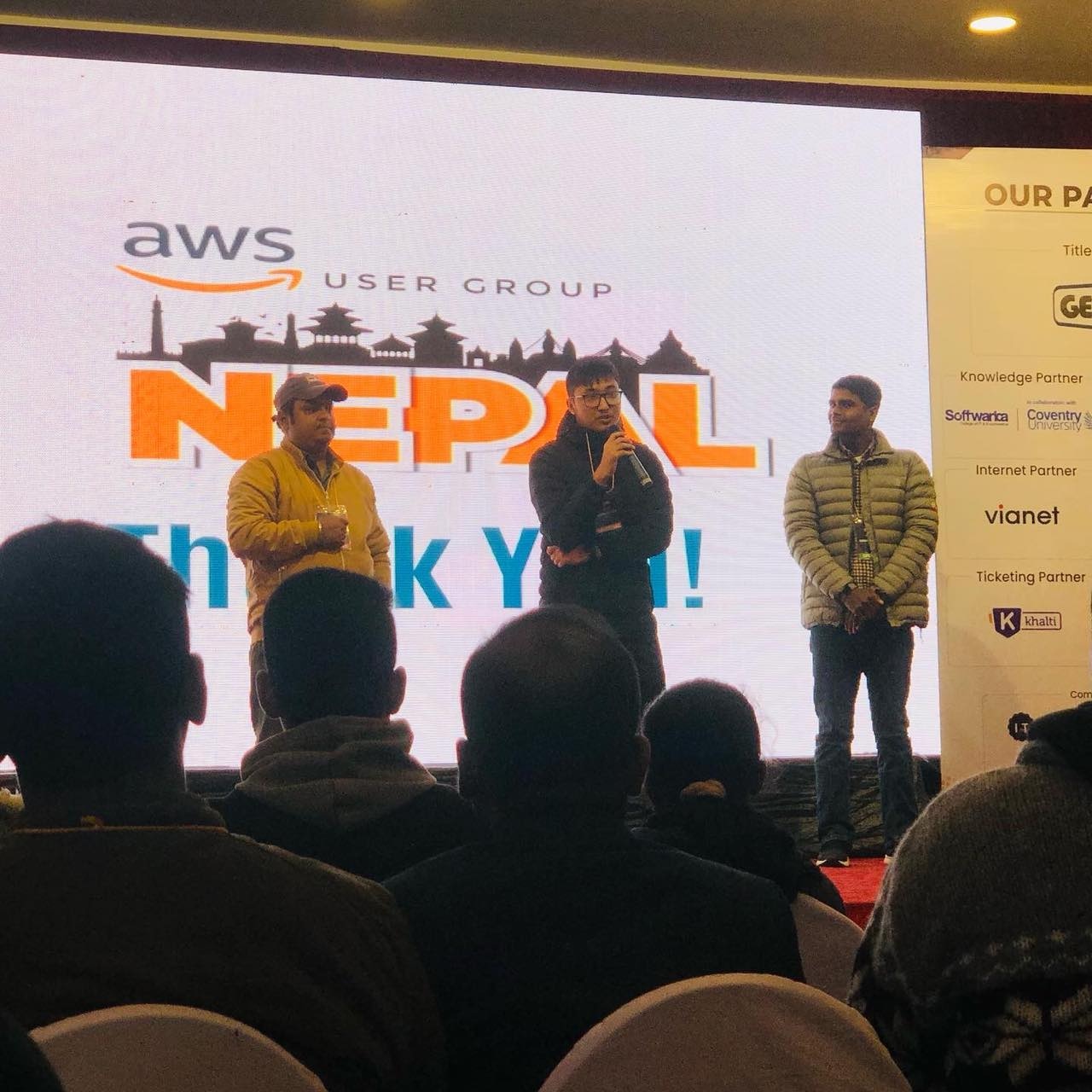
Hackathon, hehe one of my favorite thing which I love to do. When I heard about the first time buzzword Hackathon, I thought it was CTF which is common in the infosec community. But I was misunderstood, Hackathons are events (virtual or onsite) to engage computer enthusiasts to solve the issue assigned by the organizer. You are required to solve this by building web apps, android apps, or anything else. At least you and your team should be built MVP for the ideas to solve it. A common question might be raised for newbie programmers, should I need to be an expert in my stack for the hackathon? No, it’s not.
It’s for everyone. You don’t have to perfect your niche skill. It’s an awesome opportunity to showcase your skills within a short period and who knows sponsored companies might give you opportunities like an intern or full-time job position too if you become the winner. Hackathons come with prizes, free food, many premium services free too, and swags. If you are in the initial career, I highly recommend getting participated in Hackathons.
Here is a list of a few hackathons and competitions.
Build your Portfolio
Trust me, your portfolio website will play a major role in your career advancement and bring new opportunities to you. Always separate yourself from the crowd and be unique. To procedure this one, you need to enhance your portfolio.
Open source presence with the active involvement of the community based on your interest might help you to enhance your portfolio and further reach out to hiring managers and recruiters. LinkedIn is your online professional identity and a great place to maintain & build connections, communicate with potential employers, and highlight your accomplishments.
It’s often the first place recruiters look when a new job posting opens up, and it’s a great place to advertise your online portfolio. GitHub is also one of the great platforms for developers to showcase their skills through open-source contributions. You never know when a great opportunity will come along, so update your profile and news feed early and often.
Build Projects
As you got a good foundation in Computer Science and niche domains, start building basic projects. Look over your daily wage problem and try to resolve it by building the project. It can be just a to-do or alarm application. If you don’t get ideas you can take the reference from this source.
The best way you can start the project is either the personal website or a university project. You can also open source further to work iteratively publicly and demonstrate your skills to potential employers and yourself. Always demonstrate your skills that can’t be demonstrated in class too.
Preparation for Opportunities
You can neither fully prepared for job placement or any opportunities. But you can prepare early on to grab it as quickly as possible at the right time. As you possess a strong foundation in Computer science with the project. You can move out of your comfort zone by gaining real-world industry experience.
Hey, we got here a chicken-egg problem. You need a job to get experience and to get experience you need a job. Sounds confusing right, you can bypass this fault. To get the experience you can either grab an internship opportunity or be involved with a freelance project else active open source with the community for a longer period will be worth it.
Internship
An internship is one of the best ways to get a foot in the door for a great tech job. It’s a first-hand insight into the work environment, workplace culture, and expectations of your interest field by building your skills and knowledge on the job. If you bring enough of an impact on the company, it often leads to a full-time position after the completion of your internship.

It gives you networking opportunities and even university course credits. Some bachelor’s degree programs may even require an internship as part of the curriculum. The internship is not something that they expect you everything from the day first. They wanted to see how you can approach problems with their business model and see whether you can be further full-time employment or not.
Also, be aware of and no for the internship with the below points.
- Seniors don’t look over your progress and help out there
- No learning of any industry practices
- Feels like you are the smartest in the room
- No formal onboarding process to get you up and running
- No sync-up with your assigned seniors
I highly recommend you strengthen your resume for full-time or internship.
Here is the resume guide for you with resume template.
Securing an internship can be a competitive process, so don’t get discouraged by rejections. Learn from each experience, refine your approach, and keep trying. Persistence and determination are key to landing the right internship opportunity. There are many platforms to apply for internship program.
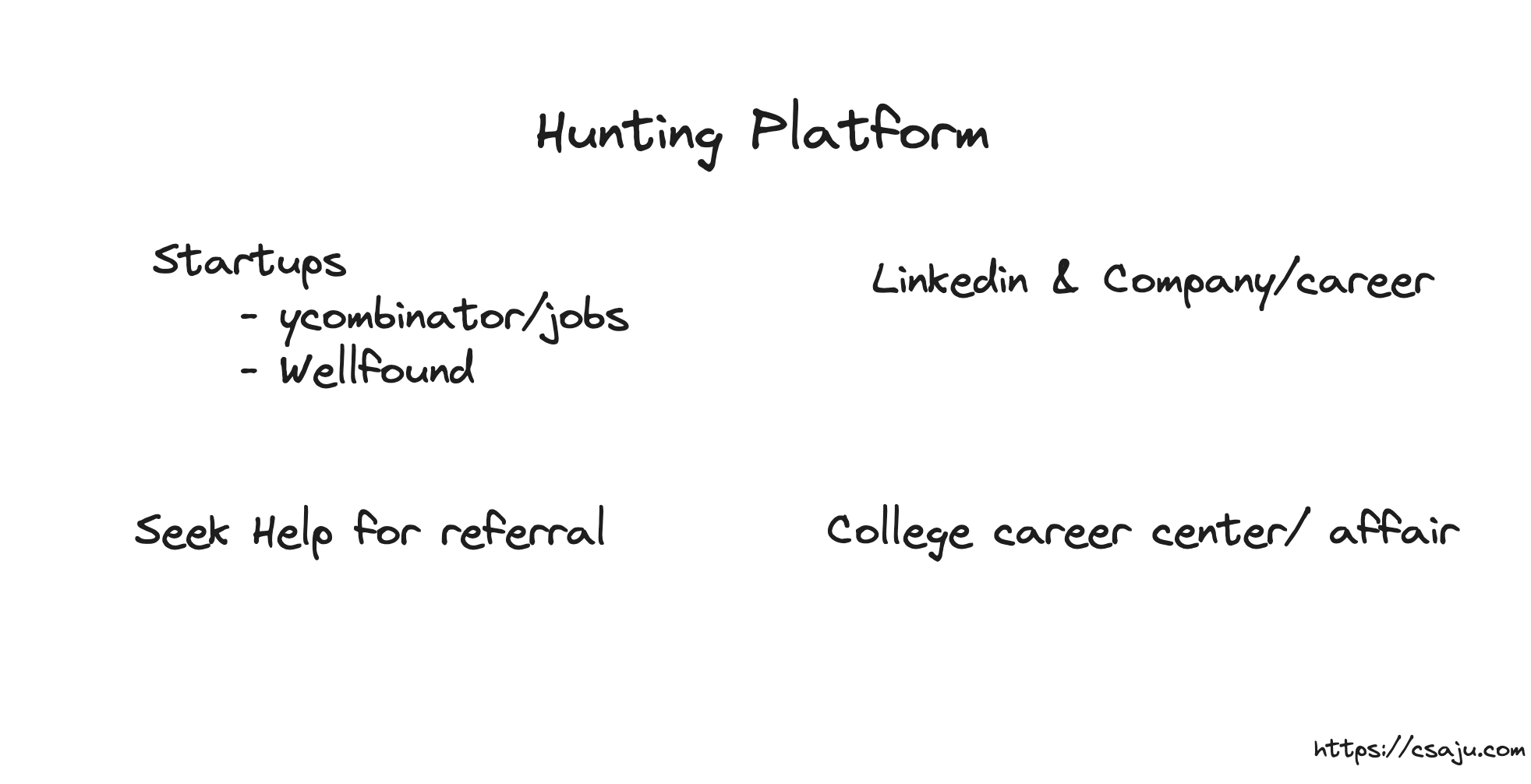
At LinkedIn, set yourself up to receive job alert options. Start applying early as possible with an updated resume. If you are a freshman or sophomore year. There is a specific internship program for that one.
Let’s talk about the open-source program, it’s about community and learning from each other. Open-source programs will enhance your skills and help in your career. You will also get a stipend for your contributions but hey it doesn’t mean having contributions more in the program can make you earn more money. It’s not about the money, it’s about learning and enjoying the process. There are many open-source programs and mentorship that will give you to exposure of open-source communities whether it is data, cloud, Linux, or something else. Highly recommended for students to be a part of it. I will write the open-source program more deeply about its guide and how you can be a part of the open-source community.
Joining a startup even temporarily will make you a better engineer. For startup I highly recommend Ycombinator job portal and Wellfound(formerly AngelList)Ask Referrals and seek help from your connections. Be polite while asking for referrals. Instead of Saying Hi and waiting for the person to respond before asking your questions. You can also give a straight point to your connection for help. It is incredibly effective. If a company receives your profile through an existing employee via referral, it saves their time in hunting for a fresh candidate and they will have an established trust that you are legit. Trust plays a major role in recruitment because as much as you need a job in a good company, the company needs a good candidate like you. Also, talk to LinkedIn recruiters, and ask if they are hiring interns for a particular team too.
Securing Interview
First thing, you are going to have a lot of setbacks, failed a lot of interviews. Be strong and grind hard mentally too. Getting an interview is important initially. As mentioned, a resume is critical, and make sure it’s perfect enough to get at least the initial round. Also if an application requires a cover letter, don’t go lazy on it. It’s also one of the chances to highlight your difference from the crowd.
Resume is the entry point to getting shortlisted by companies.
Here is the sample initial interview format
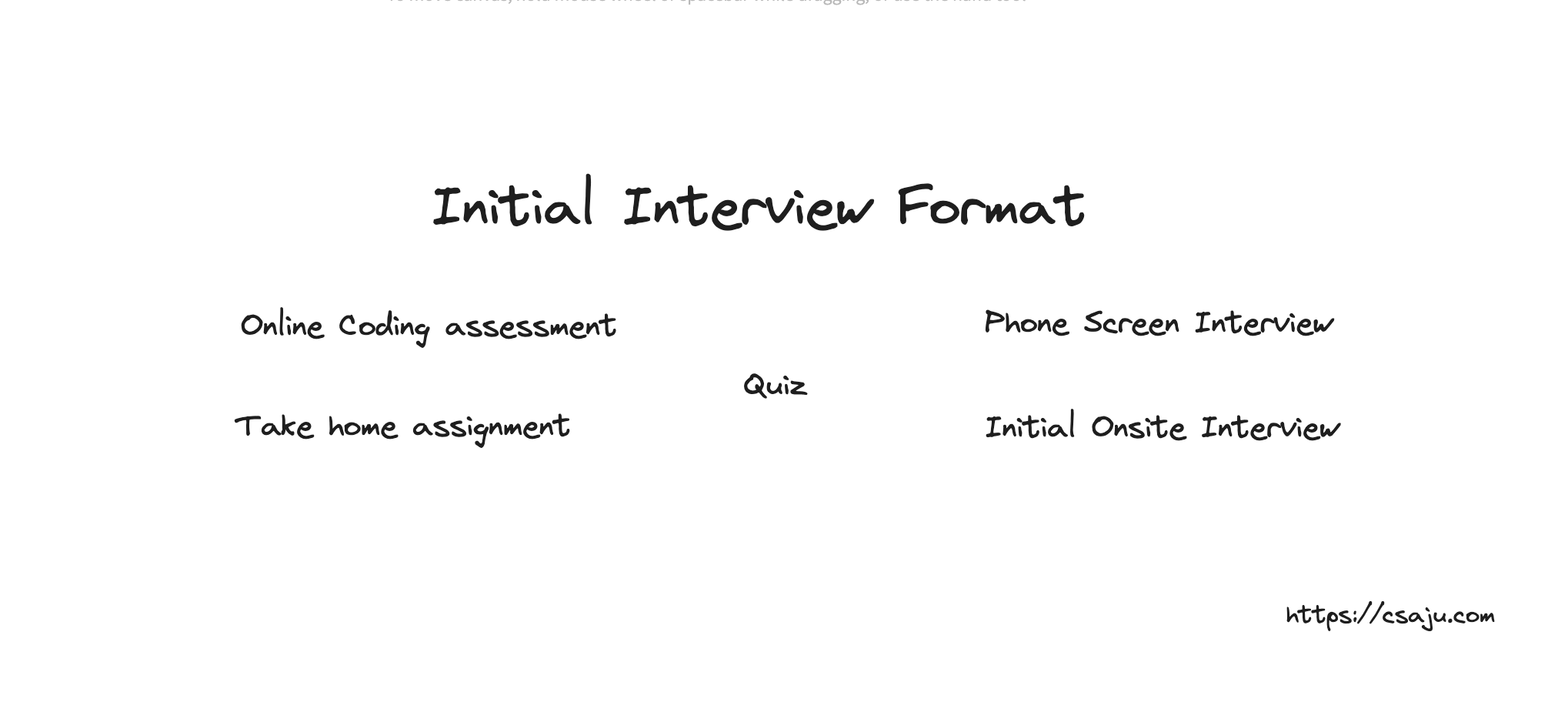
For the onsite one, I prefer you to bring your laptop too. You might also have a lunch session with an employee where you can find out more about the company culture.
Once you get shortlisted make sure you have prepared for the introduction stage. The introduction section teaches you how to maximize your chance of applying to impress a Hiring manager or Recruiter. Give more context about who you are, who you work, what you do, and so on. Introduce yourself in a few sentences under a minute or less than 2 minutes where your sounds also prove enthusiasm.
Things that you should consider before a virtual interview
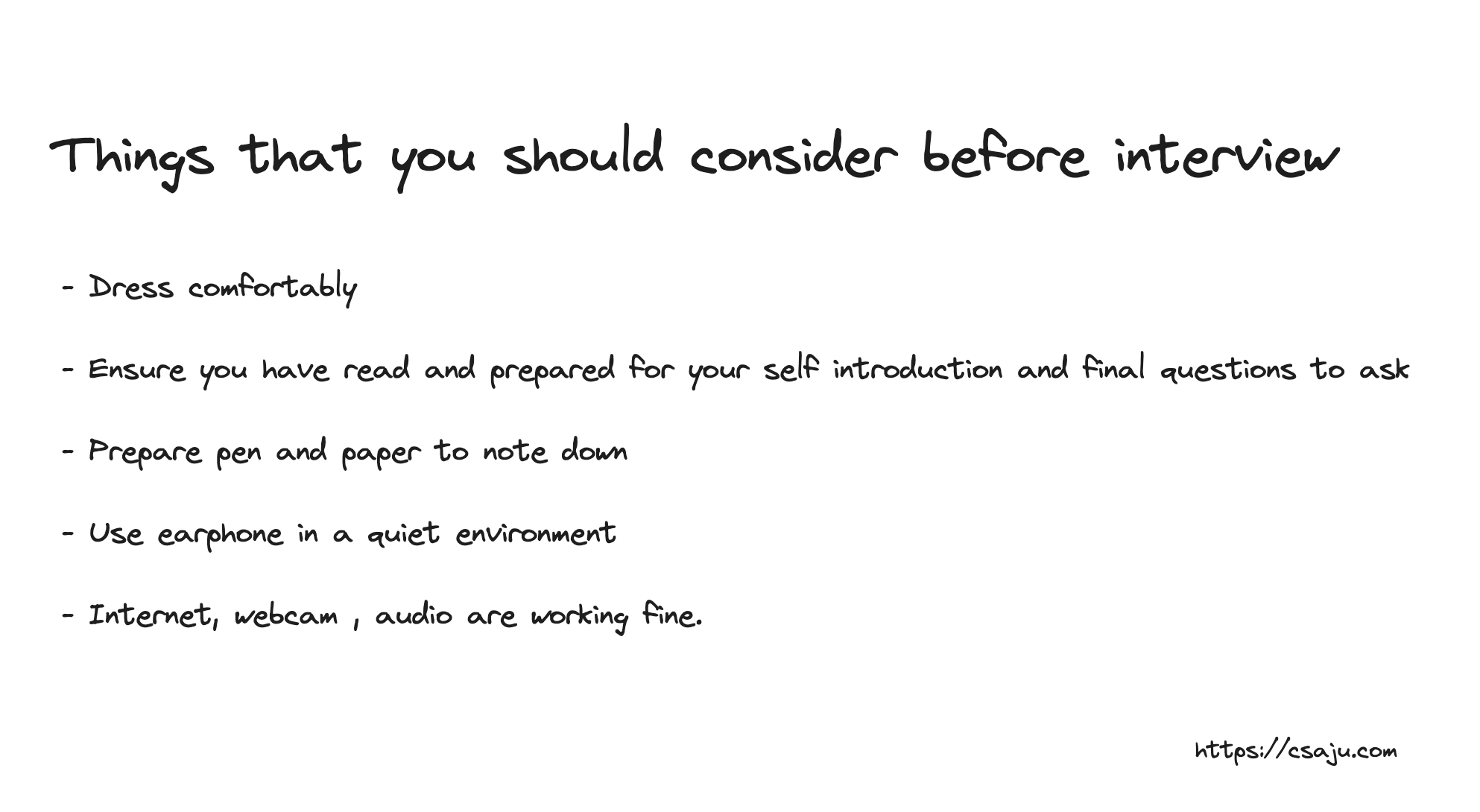
You will also be getting a technical interview or coding round. Coding interviews are a form of technical interviews. For the recent graduate SDE role, questions like algorithms, data structure, and CS subject are being asked whereas as senior one system design and so on. The coding round typically exists about 30-45 minutes and you are expected to write code in real time. For programming one, you will be free enough to use any language you want. Always pick the one you use the most and most comfortable with it.
Don’t learn new programming for coding interview
To personalize your core coding skill you can choose the following platforms.
Few Other resources
Some resources rely on programming-related opportunities.
For trying out mock coding interviews You can choose the below one.
Only start coding after you have explained your approach and the interviewer has given you the green light. After coding, check your code and add test cases too. After the interview, the interviewer will compile their feedback and give a hire/no-hire recommendation as well as the candidate’s seniority. Follow up and express gratitude by sending personalized thank you emails to the interviewer or the hiring manager.
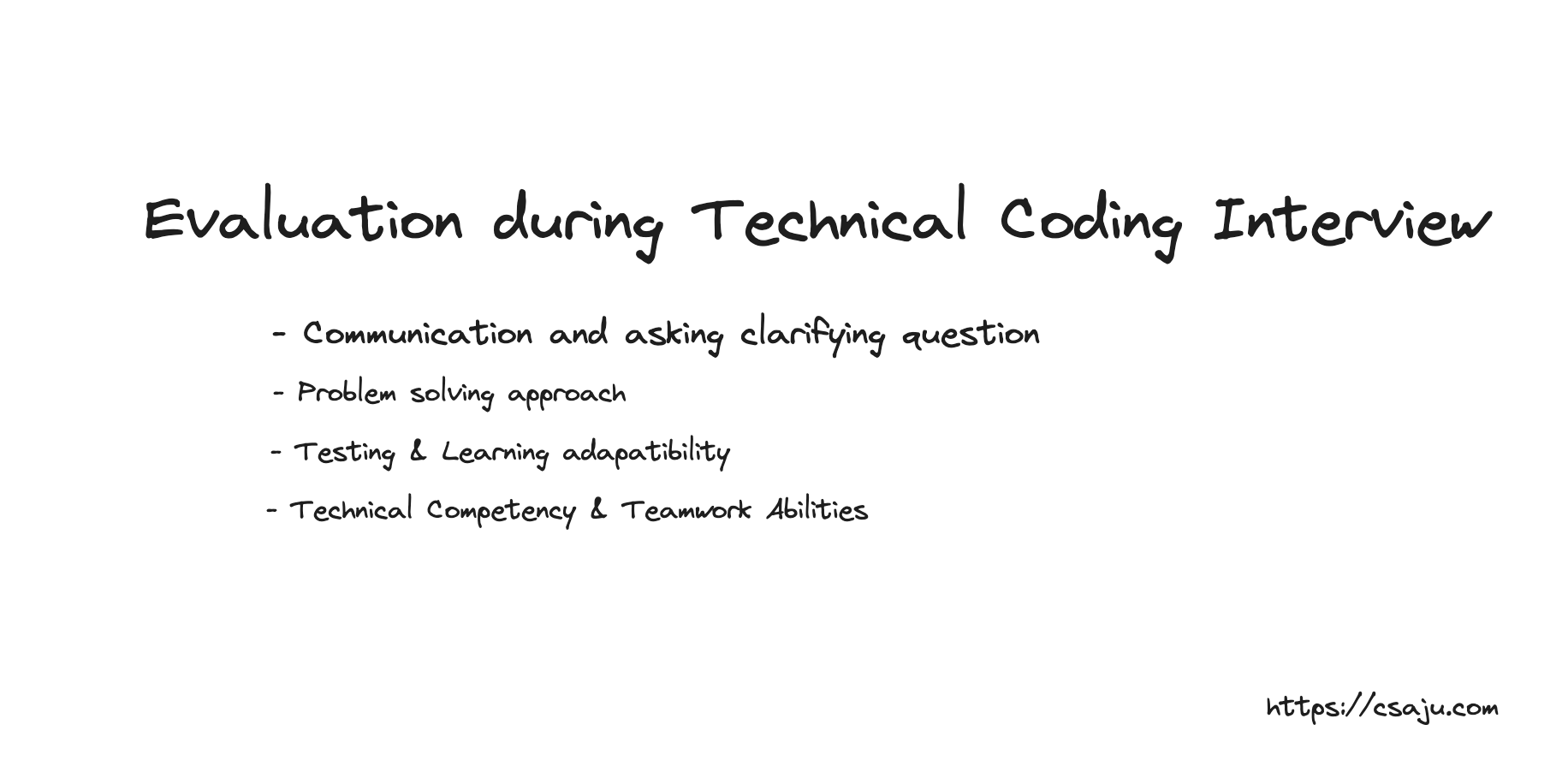
For the behavioral round, you can approach the STAR method.

Be prepared: Listen to the question and think of an event.
- Situation: Share details about the situation or events that you were in.
- Task: Explain your responsibility in that situation.
- Action: Describe the steps you took to contribute or accomplish a task.
- Results: Describe the outcome of your actions and what you learned
Resources
Conclusion
With every interview, you will learn, improve and become a better professional. Remember, everyone’s journey is unique, so don’t be discouraged by setbacks. Even if you do everything right, it doesn’t mean life will treat you right. Real life is not like in school where if you put in the effort, you get good grades. Real life is unpredictable. Stay persistent, keep learning, and leverage your skills and knowledge to create a successful tech career. And All the best.